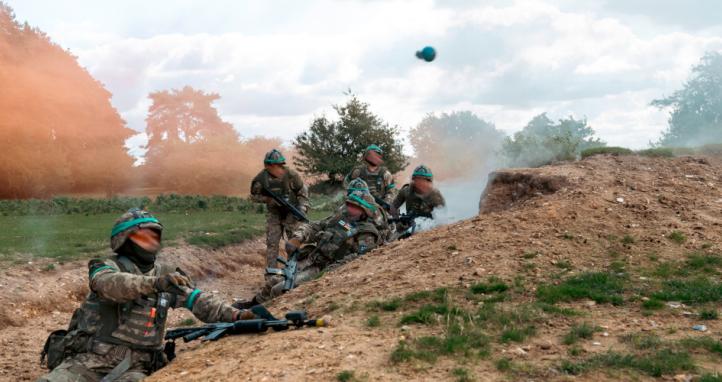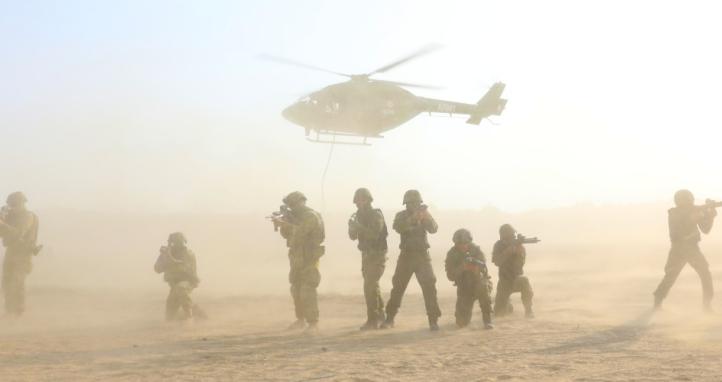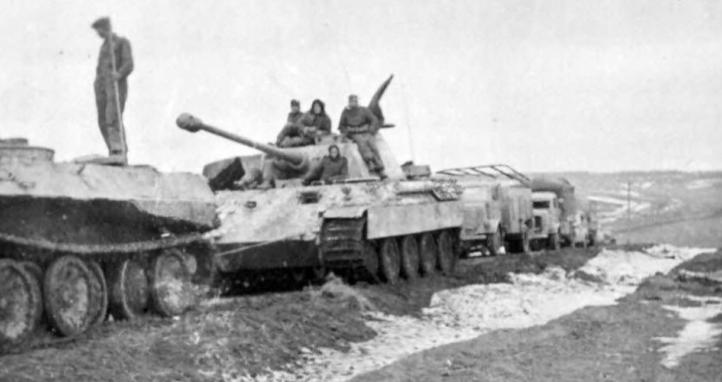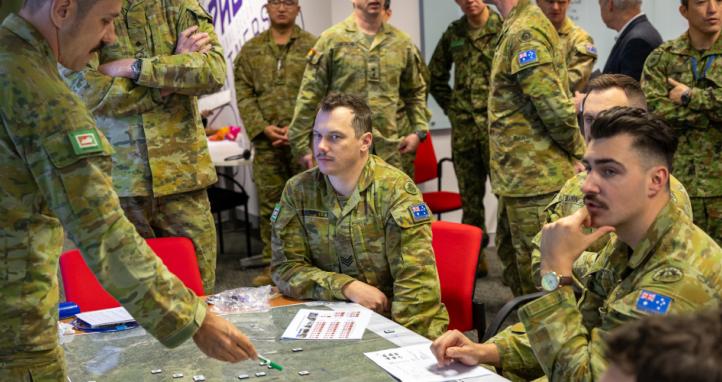“If you haven't read hundreds of books, you are functionally illiterate, and you will be incompetent, because your personal experiences alone aren't broad enough to sustain you.”
– Jim Mattis, Call Sign Chaos: Learning to Lead
I have through my service become an avid reader and a lot of it comes from the famed Mattis letter which conveys so much truth in the necessity of learning and education. Sent on the eve of the 2003 Iraq invasion and the subsequent viral distribution in the years later, the letter eloquently articulates the necessity of reading and its value (available here: Strife Blog).
Defence publishes reading lists focusing on different ranks, points in one's career, and domains. The reality is though, with a whole of army reading list and even brigade specific reading lists, I find these are often combat arms centric and lacks an appreciation for the role of communicators; often operating under the assumption communications will always be there, or a more upbeat 'comms are good' mentality. The role of signals is best served in line with its motto ‘swift and sure’, but for signallers to achieve their mission, a reliable reading list is warranted.
I’ve compiled the following library of resources for the prospective signals soldier and officers to prepare themselves as part of ongoing professional development.
Communications | History | All Corp Skills | Biographies
- Watson's Pier
Watsons Pier is a book about SH Watson, an RA Sigs officer at Gallipoli. He was one of the first on the shore, and the last off. There’s an interesting side note on deception by the Turks in the book that is quite relevant to us in the modern information warfare space. https://www.amazon.com.au/Watsons-Pier-Joshua-Funder/dp/052286757X - 18 Hours: The True Story of an SAS War Hero
This book should be compulsory reading for all new signallers. The easy read and the emphasis on the communications, strategy and warfighting executed by a single signaller highlights the role of a military signaller – communicator, shooter, and analyst who is capable of understanding the battlespace as well as any strategic thinker.
https://www.amazon.com/18-Hours-True-Story-Hero/dp/0732282306 - The Duke: A Hero's Hero at Sandakan. Captain Lionel Matthews GC, MC
CAPT Matthew’s Biography should be a staple for any communications officer. The team formation, interaction between discipline and technical competence, and sheer heroism is an example best visualised in this book. Some of the finer points for on the ground leadership are excellent lessons for the junior leader.
https://www.amazon.com/Duke-Sandakan-Captain-Lionel-Matthews/dp/B001QNKG9K - A Man of Intelligence: The Life of Captain Theodore Eric Nave
Eric Nave's operational competence, in terms of foundation and subsequent leadership as part of a “total life” was evident throughout this book. Of particular note, the formative years of his life in Japan played out 20 years down the track, perhaps a lesson we could all learn.
https://www.amazon.com/Man-Intelligence-Australian-Codebreaker-Extraordinary/dp/1459649214
Electronic Warfare
- The Secret Code-Breakers of Central Bureau
A narrative of the Australian Defence Force’s role in breaking Japanese and Nazi codes, this book explores the lives of several participants in the allied signals intelligence effort during World War 2. Excellent takeaways include lessons on operational security, opportunity for exploitation, as well as forming multidisciplinary teams.
https://www.amazon.com.au/Secret-Code-Breakers-Central-Bureau-signals-intelligence-ebook/dp/B071P22XY5 - The American Black Chamber
The book is a great walkthrough of sample problems, fundamentals of which we still encounter today. I would however encourage the reader to be mindful that O’Yardley was still a traitor and the 1930s equivalent of Edward Snowden. - The Codebreakers
This is perhaps the most comprehensive history book on cryptography and electronic warfare. Spanning ancient times through to the modern period, David Kahn provides a detailed account of security and communications throughout the years.
https://www.amazon.com/Codebreakers-Comprehensive-History-Communication-Internet/dp/0684831309 - The Zimmerman Telegram
Whilst referenced in several of the books above, Barbara Tuchman's book is an excellent strategic view of the role of communications and its impact when it fails. The book also touches on the role and nature of the code breakers of room 40.
https://www.amazon.com.au/Zimmermann-Telegram-Barbara-Tuchman-ebook/dp/B00KGKY9JM - The Spy in Moscow Station
A modern account, the former NSA protagonists of this book highlight a deficiency in our own exploration of communications amongst our personnel, the impact of an aggressive threat, as well as internal struggles that are familiar in any bureaucracy.
https://www.amazon.com.au/Spy-Moscow-Station-Counterspys-Deadly/dp/1250301165
Cyber
- Darknet Diaries (podcast)
Darknet Diaries is a podcast created by Jack Rhysider, and explores a number of phenomenal cyber security narratives that cross multiple elements of the discipline.
www.darknetdiaries.com - The Art of Intrusion
Published in 2005, Kevin Mitnick explored a number of examples and lessons learnt of technical exploits in the years prior.
https://www.amazon.com.au/Art-Intrusion-Exploits-Intruders-Deceivers/dp/0471782661/ - We Are Anonymous: Inside the Hacker World of LulzSec, Anonymous, and the Global Cyber Insurgency
Whilst comparatively a piece of hallowed antiquity, Parmy Olson's exploration gives us insight into non-nation state actors in cyber space in a richer, less restrictive environment that allows us to understand drivers, motivations, origins and networks within the cyber security domain. These lessons have eventually followed onto other non-nation state actors, which makes this book an excellent start. I’d also recommend Brian Krebs’ book spam nation to dive further into cultural aspects of organised crime.
https://www.amazon.com.au/We-Are-Inside-Lulzsec-Insurgency/dp/0316213527 - Countdown to Zero Day: Stuxnet and the Launch of the World's First Digital Weapon
Kim Zetter was one of the original reporters of Stuxnet and provides a detailed account from several players of how Stuxnet was discovered and deductions as to the future.
https://www.amazon.com.au/Countdown-Zero-Day-Kim-Zetter/dp/0770436196 - The Hacker and the State
Perhaps the modern-day equivalent book to The Zimmerman Telegram, this book, published in 2020, is a good modern analysis of cyberspace from a geopolitical standpoint.
https://www.amazon.com.au/Hacker-State-Attacks-Normal-Geopolitics-ebook/dp/B082DLMC6L
Information Warfare
- Active Measures
Thomas Rid’s book should be the cornerstone of anyone moving into the information space. The activities undertaken by a number of nation states since World War 2 provide us with a guide to the modern state of deception and manipulation.
https://www.amazon.com.au/Active-Measures-History-Disinformation-Political/dp/0374287260 - Art of Deception
Sister book to the art of intrusion, Mitnick looks at an individual level how to coerce or manipulate human beings.
https://www.amazon.com.au/Art-Deception-Controlling-Element-Security/dp/076454280X/ - Like War
PW Singers account of the weaponization of social media.
https://www.amazon.com.au/LikeWar-Weaponization-P-W-Singer/dp/1328695743
Side Books
These books are more companion materials rather than dedicated resources, but they do give us insights relevant to us as signallers:
- Start-Up Nation
This book has a detailed account on the cultural attributes of Israel and its status as an innovative nation. This is grounded largely in the country's military, which itself sets an example for innovation.
https://www.amazon.com.au/Start-Up-Nation-Israels-Economic-Miracle/dp/0446541478 - The Command of The Air
Replace the work air with cyber, and the Italian strategist Giulio Douhet's book compiled on air power theory written in 1922 gives us a few thoughts and ideas to consider from a strategic standpoint.
https://media.defense.gov/2010/Sep/24/2001329765/-1/-1/0/AFD-100924-017.pdf - Zero to One
Peter Thiel's ideas and strategies are concentrated in this book as well as the emphasis on self-thinking, and a reflection on his own growth.
https://www.amazon.com/Zero-One-Notes-Startups-Future/dp/0804139296 - Mosul: Australia's secret war inside the ISIS caliphate
This book is an effective analysis on land war and how technology can enable war. There's an excellent segue on mobile phones as well as drones which are relevant to us in the battlespace.
https://www.amazon.com.au/Mosul-Australias-secret-inside-caliphate-ebook/dp/B08D37RR8K - Fast Tanks and Heavy Bombers: Innovation in the U.S. Army
This book is already listed in an existing reading list, but its details are analogous to the resistance in technological adaptation and hesitancy to employ technology.
https://www.amazon.com.au/Fast-Tanks-Heavy-Bombers-Innovation/dp/0801488478
Books in my Reading List
The following is a list of books that are in my reading list that I am yet to dive into but are on the to-do list:
- Signals – Swift and sure. A history of the Royal Australian Corps of Signals 1947 – 1972 (available from the museum)
- Dark Territory: The Secret History of Cyber War by Fred Kaplan
https://www.amazon.com.au/Dark-Territory-Secret-History-Cyber/dp/1476763267 - The Principles of War for the Information Age by Robert Leonhard
https://www.amazon.com/Principles-War-Information-Age-ebook/dp/B001QAP3KA - Troll Hunting by Ginger Gorman
https://www.amazon.com.au/Troll-Hunting-Inside-online-fallout/dp/1743794355 - Deception and Counterdeception by Robert Clark and William Mitchell
https://www.amazon.com.au/Deception-Counterdeception-Counterintelligence-Robert-Clark/dp/1506375235 - Ethics and Cyber Warfare: The Quest for Responsible Security in the Age of Digital Warfare by George Lucas
https://www.amazon.com.au/Ethics-Cyber-Warfare-Responsible-Security-ebook/dp/B01N7D2JAK/ - Deception in the Digital Age by Cameron Malin, Terry Gudaitis, Thomas Holt, and Max Kilger
https://www.amazon.com.au/Deception-Digital-Age-Computer-Mediated-Communications-ebook/dp/B072JYM4M2/ - Sandworm by Andy Greenberg
https://www.amazon.com.au/Sandworm-Cyberwar-Kremlins-Dangerous-Hackers/dp/0385544405 - Room Forty: British Naval Intelligence 1914-18 by Patrick Beesly
https://www.amazon.com.au/Room-Forty-British-Intelligence-1914-18/dp/0151786348
Regardless of how technically complex the environment signallers operate in, or the notion that computers will solve everything, the fundamental capacity of RA Sigs officers is to think on their feet, adapt and overcome in a complex environment. Literature serves as an excellent grounding to study and prepare for this complexity, and I hope this list is a good start for personnel to get across all the identified domains.
Feel free to add to the list over time.









